A new international study has found that amphibians and reptiles inhabiting the world’s nature reserves, or Protected Areas (PAs), will be better protected against climate change than species found outside of these areas, but are still likely to be harmed.
The research findings provide evidence, on a global scale, of the crucial role Protected Areas play in conserving amphibian and reptile biodiversity under human-induced climate change scenarios. The study reveals that more animals will become extinct because of climate change outside of Protected Areas than inside them — in the world in general and on most individual continents.
Protected Areas as Refuges
Prof. Shai Meiri of Tel Aviv University’s School of Zoology, The George S. Wise Faculty of Life Sciences and The Steinhardt Museum of Natural History took part in the study, in collaboration with leading researchers from 19 countries. The study was published in the prestigious journal Nature Communications.
Read more at Tel Aviv University
Image: Prof. Shai Meiri (Credit: Tel Aviv University)


